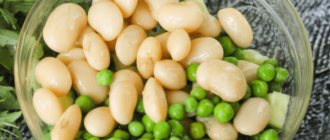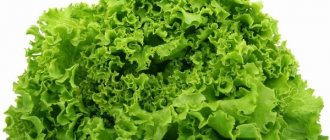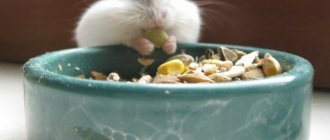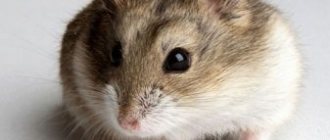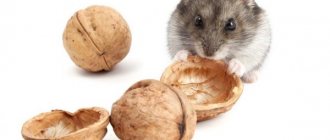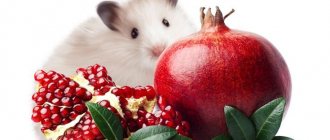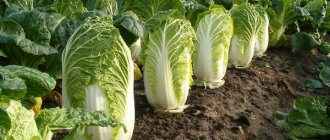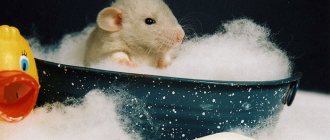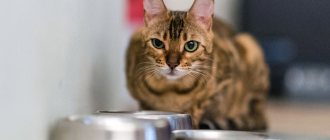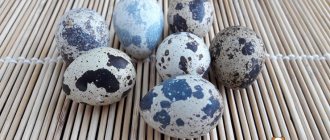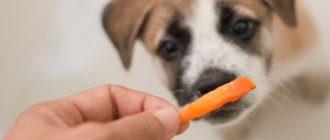Is it possible to give hamsters carrots?
Rodents need to be given carrots regularly. Allowed for daily consumption. In addition, the pet will receive additional moisture from this vegetable.
Small hamsters can be given carrots as soon as they begin to eat dry food on their own. And for a pregnant hamster, this is a must-have product in the diet.
The hamster eats carrots. How much: cut a circle from the carrot, 1-1.5 cm thick and give it to the animal. Do not try to give more, the hamster will begin to stockpile, and the vegetable may quickly rot or dry out. In any case, such a product is unsuitable for food, and midges may also appear in the house.
Effects of Pomegranate on Hamster Species
Djungarian hamsters are found in the steppes of Western Siberia and have recently quickly won love and adoration for their peaceful disposition, amusing appearance and active lifestyle. In its natural habitat, the animal feeds on seeds and green plants, and sometimes insects. It is natural to assume that the hamster is not familiar with the exotic taste of pomegranate. Therefore, an unknown and unusual fruit can cause a negative reaction of the body to the proposed delicacy , from allergies to death.
The Syrian hamster is native to the hot steppes of Syria and Turkey. The unpretentious, clean and playful animal has become extremely popular and has established itself as an ideal pet. In the wild, the animal feeds on seeds, nuts and small insects . Owners of Syrian hamsters note the amazing omnivorousness and simplicity of their pets. Taking into account the homeland of rodents, it can be assumed that the body of the Syrian hamster is more adapted to accepting pomegranate in its diet.
However, despite their different habitats and similarities in natural nutrition, their anatomical structure and secretion of internal organs are similar. Therefore, the perception of the pomegranate and the reaction of the individual are the same.
Regardless of the breed and place of origin, feeding pomegranate can make your pet sick .
Raw or boiled: what kind of carrots should you give your hamsters?
Overall there is not much difference. Raw contains more nutrients and vitamins. But it needs to be washed and cleaned well. It is preferable to give vegetables from your own garden. In the warm season, you can try growing some carrots on the balcony.
Store-bought carrots can be treated with pesticides and other harmful substances that will not harm humans, but may harm the health of a tiny animal.
If you have no choice, then store-bought carrots must be soaked in cold water for at least 3 hours to remove most of the harmful substances.
Hamsters can also be given boiled carrots, but do not do it often, because when cooked, there is practically no benefit from the vegetable. Raw carrots are dense and help to wear down the animal’s teeth, which grow throughout its life.
Delicious carrots for your hamster If you still decide to give a piece of boiled vegetable, then you should not do it from your soup or other dishes. It is necessary to cook without salt and spices.
If you have an electric dryer, you can prepare root vegetables for the winter and add them to your main grain feed throughout the year.
Briefly about feeding
How should you feed your hamster? Should food be kept in the cage at all times? It should be borne in mind that a pet is a thrifty creature. And he will definitely hide food in his cheek pouches, carefully take it to the house and place it in a secluded corner. The rodent is fed twice a day. In the morning they pour a bowl of food and give him something tasty, in the evening the same scheme. There should be constant water in the drinking bowl. It is changed daily, and care should be taken to ensure that the drinking bowl is full. Once a week, the cage is disinfected, along with the feeders and drinking bowls.
Is it possible to give hamsters carrot tops?
Store-bought tops are not the best food option for a rodent. A large amount of substances can also accumulate in it. If you give a little tops, the hamster will eat it with pleasure, but then problems with digestion may begin.
If you want to please with green leaves, then buy parsley, celery or lettuce.
But if you grew carrots in your garden, then you can safely pamper your pet with carrot tops. It is especially useful for Djungarians, as it prevents heart attacks, diabetes and colds. And these animals are very predisposed to such problems.
Carrot tops have 5 times more vitamins than root vegetables, but don't overdo it. You should not give more than 1 tbsp. per day.
Now you know everything about the benefits of carrots for a hamster. Don’t be afraid to give it to your rodent, he will only be grateful to you, the main thing is to follow the dosage.
Can hamsters eat carrots?
Hamsters are very cute rodents. Often people buy them as a pet. At such moments, the question arises about the baby’s diet. Is it better to feed the animal, dry food or diversify the diet with some vegetables, for example, carrots? This root vegetable is in every apartment and some people cannot imagine life without it. Can hamsters eat carrots?
Of course, carrots are possible and even desirable. But do not forget that the hamster needs to eat other food. Dry food designed specifically for him and rich in various nutrients.
Fruits
We sorted out the question of vegetables and the question of whether hamsters can have fresh cucumbers. Now let's move on to fruits. So often you want to pamper your funny hamster with something tasty and healthy. But what can you give a rodent? What fruits will not harm the health of the baby?
First of all, hamsters can't eat citrus fruits. Secondly, their diet should not contain “overseas” fruits. For example, kiwi and bananas. And before you treat the animal, you need to wash the fruit, ideally scald it with boiling water and cut off a small piece. The list of healthy fruit goodies is below:
- Apples.
- Pears.
- Peaches.
- Apricots.
- Plums - a little.
- Dried fruits: raisins, dried apricots, dried apples.
Fruits must be fresh and in no case rotten or spoiled.
Properties of the root vegetable
Carrots contain a lot of positive properties:
- This product contains vitamin A, which supports healthy bones, vision, and immune system.
- Vitamin K, which affects blood clotting.
- Vitamins C and B, without which the normal functioning of the body is also impossible.
- In addition to vitamins, it contains chromium, protein, iodine, phosphorus, calcium, carotene, and iron.
Another benefit of the root vegetable is due to the fact that it is a solid product. The hamster eats carrots and grinds down its teeth, which are constantly growing. These animals are constantly looking for something to chew; a piece of vegetable can replace a mineral stone.
It also contains a lot of juice, which quenches thirst well. If carrots appear regularly in the animal’s diet, then it will not have problems with dehydration.
We treat you to vegetables
They are given to the sweet baby in raw form. And for some reason, the first question for most inexperienced owners is whether it is possible to feed a hamster with cucumbers and cabbage. The list of allowed vegetables is presented below:
- Carrot.
- Bulgarian pepper.
- Zucchini and squash.
- Fresh corn.
- Fresh peas.
- Beets in small quantities.
- Pumpkin.
And finally, the answer to the question: can hamsters eat cucumber? Yes, it is possible and necessary. Only previously peeled.
Carrots for Djungarian and Syrian hamsters
It is useful for all types of hamsters, including Djungarian and Syrian. Djungarians need it because their blood sugar levels often rise and they have problems with excess weight. Carrots help keep this breed healthy.
It is also important for the Syrian breed to replenish the supply of nutrients in the body. Offer the product more often.
Is it possible to give carrots
To find out whether hamsters can have carrots or any other vegetables, first, let’s figure out why they need to be introduced into your pet’s diet at all. As everyone knows, any body needs vitamins and microelements: not a single process in the body will occur without the proper amount of useful substances.
Our animals are no exception; they also need nourishment and a balanced diet in order to receive everything they need for life. Due to the fact that animals live in domestic conditions, they do not have the opportunity to take care of themselves and find fortified food. Helping them with this is our task.
Vegetables, and carrots in particular, can be given to hamsters and are even necessary. Your hamster should eat vegetables every day or at least every other day. Remember that your pet has the same growing body as a small child, so his daily diet should include:
- various cereals: oats, legumes, buckwheat, wheat;
- vegetables: carrots, turnips, zucchini, cucumber.
- fruits: pumpkin, apple, pear.
What can you feed Djungarian hamsters?
If you do not know what to feed your Djungarian hamster at home, we recommend that you study this issue thoroughly. And the main rule here is do no harm. All products must be fresh and healthy, contain vitamins, fiber and other important elements. After all, a pet’s immunity, the condition of its fur and teeth directly depend on nutrition.
You should know what you can and cannot eat. The list of permitted foods is quite wide, it includes the following products:
- specialized dry food for hamsters;
- cereal grains;
- nuts;
- seeds;
- fruits and berries;
- vegetables;
- herbaceous plants;
- protein of animal origin.
The composition of energy substances and useful elements is different for each group. Let's take a closer look at what Djungarian hamsters eat at home.
Dry food
Specially formulated food for rodents that you can find at any pet store. Usually it contains grains of wheat, rye, barley, peanuts, rose hips, candied fruits and other ingredients. Grains should make up the lion's share of your hamster's diet, so they should always be in your home!
But the requirements for food for Djungarian hamsters are a little stricter than for mixtures for other breeds. The fact is that dzhungarikas cannot eat a lot of sweets, so choose mixtures with a reduced content of candied fruits, raisins and dried fruits.
Cereals
Sometimes you can feed dzungarians with cereal grains collected yourself. The following crops are suitable:
- Wheat.
- Corn.
- Oats.
- Barley.
- Rye.
When collecting cereals yourself, pay attention to their quality. The fact is that these crops are very susceptible to fungal diseases (ergot, smut, rust, etc.). Affected grains are not stored for a long time; the fungus seems to eat them from the inside, filling the space under the seed coat with its mycelium. If you feed Homa grains with ergot, at best you will get diarrhea, at worst - a nervous disorder. The animal may also die from poisoning.
You should not only carefully inspect the hand-collected material, but also thoroughly dry it. After all, mold fungi and pathogenic bacteria actively breed in a humid environment. You should not give Djungarian hamsters undried grains for another reason that they can cause an upset stomach.
By the way, about peanuts. Many people think of this delicacy as a nut, but it is actually a bean. Remember that you can feed your Djungarian hamster dried, but not roasted, peanuts! Moreover, the delicacy cannot be salted.
What else can you give hamsters from legumes? Of course, young and dried green peas, green beans, lentils.
Nuts
Many people are interested in the question: can Djungarians eat nuts, because they are very fatty? Indeed, it is not advisable for rodents to eat a lot of fatty foods; it is better to focus on proteins and carbohydrates. But nuts are a rich source of protein! Therefore, you can give your hamster nuts in small portions.
Khoma will be very grateful to you and will quickly get used to your hands if, during taming, you offer him the following yummy:
- a quarter of a walnut;
- half a hazelnut;
- almond;
- cashew nuts.
Periodic consumption of nuts will make the fur of your little friend shiny and smooth to the touch. The protein contained in the nuts will strengthen their teeth and bones, and the vitamins and minerals will support the hamster’s fragile immunity.
Seeds
A tasty and high-calorie delicacy that is rich in vitamin E. Due to the high fat content, the seeds also cannot be the basis of your homa’s diet. If you don’t know what to feed Djungarian hamsters during training, pay attention to the seeds of the following crops:
- Sunflower.
- Pumpkin.
- Zucchini.
- Sesame.
It has long been noticed that hamsters eat seeds with great pleasure and cannot stop, so you cannot offer them to the animal in unlimited quantities.
Berries and fruits
You have to be extremely careful with sweet fruits, and even more so with dried fruits, because they contain a huge amount of sugar. Although glucose and fructose are natural compounds, they can provoke a dangerous disease in a furry pet - diabetes. Djungarian hamsters, unlike other breeds, are almost not allowed sweets, except perhaps in the form of encouragement during training or cleaning the cage.
But not all fruits are considered equally beneficial for hamsters. Before you treat everyone's favorite, find out what your pet can and cannot eat.
Fluffy can be fed:
- apples, pears, bananas - every day;
- cherries, sweet cherries, pitted plums - no more than 2 times a week;
- apricot without bone – once a week;
- dried rose hips - every 2 days (in small quantities);
- grapes, strawberries, raspberries – once a week;
- raisins, prunes, dried apricots, dried cherries - as rarely as possible. Serving size – no more than 1 g.
Homa will receive many vitamins from berries and fruits, which will serve to prevent various diseases. But under no circumstances should you give fruit juices to rodents: your pet will get nothing but diarrhea from them.
Vegetables
If you just got a pet, then you still don’t know what vegetables you can give your Djungarian hamsters. In fact, the list is quite long, it's easier to figure out what you can't do.
However, check out the list of vegetable products that will suit your funny little one as a daily food:
- Zucchini and cucumbers - maintain water balance.
- Bell peppers, carrots, fresh tomatoes - for the prevention of eye diseases.
- Broccoli and cauliflower inflorescences support the immune system.
All these vegetables should be offered fresh to home. Sometimes you can pamper your furry with a piece of eggplant, celery and turnip. Twice a week you can treat the dzhungarik with pumpkin.
You can diversify your pet's menu with boiled vegetables, such as potatoes. Just cook it quickly and without salt.
Grass
Rodents can eat grass while it is fresh, or in the form of hay. Moreover, the plants for hay should be young, so as not to prick your home’s cheeks when he eats. It is better to dry the grass for your fluffy yourself, since straw is more often found in pet stores, which is sold under the guise of hay.
Some of the food you eat yourself will be liked by your pet too. First of all, this applies to fresh herbs. Herbs should be given to the animal daily, because the Djungarian hamster eats them with great appetite, and receives a lot of benefits. Fiber necessary for digestion, and vitamins and minerals for immunity - what else do you need for happiness?
So, feed homa with the following herbs:
- parsley;
- lettuce;
- plantain;
- medicinal dandelion leaves;
- clover.
Fluffy sometimes needs to be given small pieces of celery, sprigs of dill, nettle leaves and leaves of fruit trees and shrubs.
Animal products
Few people know that rodents love meat, but this is true! Djungarians especially need protein during pregnancy, childbirth and feeding babies. Therefore, during these periods they should be periodically fed with animal food.
Here's what they're allowed to eat:
- Boiled lean pork, beef, chicken fillet (cook without salt!).
- Boiled or steamed fish (not fatty!).
- White of boiled chicken and quail eggs - twice a week.
- Low-fat cottage cheese grains – once a week.
During the feeding period, you can try giving a female dzhungarika a tablespoon of low-fat kefir or homemade yogurt. In the absence of a negative reaction from the digestive system, you can feed the female every evening.
Benefit
So, we have already found out whether hamsters can eat carrots. Now you need to figure out what benefit or harm it will bring to your pet. Of course, eating a vegetable such as carrots will bring great benefits and will have an impact not only on the appearance, but also on the overall development of the pet.
In addition to the main food, each animal requires additional feeding, which consists of vegetables, fruits and some minerals. But, if your pet is hungry and there is nothing at hand, then carrots are the best option. The vegetable contains vitamins B, PPE, C, which are involved in metabolic processes and protein synthesis in the blood. Also, thanks to carotene, which is part of the vegetable, the body can receive vitamin A, which is responsible for vision and proper growth.
Delicious feeding is a must
The benefits that a hamster will get from eating a vegetable are very great:
- improvement in general condition: the animal is constantly energetic and full of strength;
- thanks to the richness of vitamins in carrots, the animal’s spring condition improves: the coat becomes smooth and silky, and the claws are strong;
- Rodents can also wear down their teeth on hard vegetables, which is very useful for such animals.
